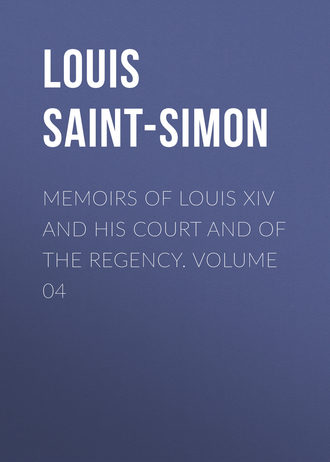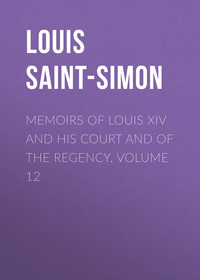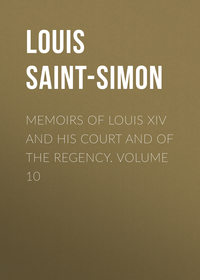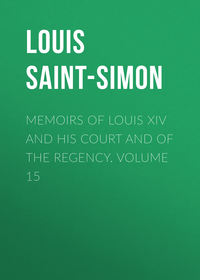 полная версия
полная версияMemoirs of Louis XIV and His Court and of the Regency. Volume 04
I learnt afterwards that he said the same thing of me in the evening to Chamillart, but, nevertheless, that he did not seem at all shaken in his prejudice in favour of M. le Grand. The King was in fact very easy to prejudice, difficult to lead back, and most unwilling to seek enlightenment, or to listen to any explanations, if authority was in the slightest degree at stake. Whoever had the address to make a question take this shape, might be assured that the King would throw aside all consideration of justice, right, and reason, and dismiss all evidence. It was by playing on this chord that his ministers knew how to manage him with so much art, and to make themselves despotic masters, causing him to believe all they wished, while at the same time they rendered him inaccessible to explanation, and to those who might have explained.
I have, perhaps, too much expanded an affair which might have been more compressed. But in addition to the fact that I was mixed up in it, it is by these little private details, as it seems to me, that the characters of the Court and King are best made known.
In the early part of the next year, 1704., the King made La Queue, who was a captain of cavalry, campmaster. This La Queue was seigneur of the place of which he bore the name, distant six leagues from Versailles, and as much from Dreux. He had married a girl that the King had had by a gardener's wife. Bontems, the confidential valet of the King, had brought about the marriage without declaring the names of the father or the mother of the girl; but La Queue knew it, and promised himself a fortune. The girl herself was tall and strongly resembled the King. Unfortunately for her, she knew the secret of her birth, and much envied her three sisters—recognised, and so grandly married. She lived on very good terms with her husband—always, however, in the greatest privacy— and had several children by him. La Queue himself, although by this marriage son-in-law of the King, seldom appeared at the Court, and, when there, was on the same footing as the simplest soldier. Bontems did not fail from time to time to give him money. The wife of La Queue lived very melancholily for twenty years in her village, never left it, and scarcely ever went abroad for fear of betraying herself.
On Wednesday, the 25th of June, Monseigneur le Duc de Bourgogne had a son born to him. This event caused great joy to the King and the Court. The town shared their delight, and carried their enthusiasm almost to madness, by the excess of their demonstration and their fetes. The King gave a fete at Marly, and made the most magnificent presents to Madame la Duchesse de Bourgogne when she left her bed. But we soon had reason to repent of so much joy, for the child died in less than a year—and of so much money unwisely spent, in fetes when it was wanted for more pressing purposes. Even while these rejoicings were being celebrated, news reached us which spread consternation in every family, and cast a gloom over the whole city.
I have already said that a grand alliance, with the Emperor at its head, had been formed against France, and that our troops were opposing the Allies in various parts of Europe. The Elector of Bavaria had joined his forces to ours, and had already done us some service. On the 12th of August he led his men into the plain of Hochstedt, where, during the previous year, he had gained a victory over the Imperialists. In this plain he was joined by our troops, who took up positions right and left of him, under the command of Tallard and Marsin. The Elector himself had command of all. Soon after their arrival at Hochstedt, they received intelligence that Prince Eugene, with the Imperialist forces, and the Duke of Marlborough with the English were coming to meet them. Our generals had, however, all the day before them to choose their ground, and to make their dispositions. It would have been difficult to succeed worse, both with the one and the other. A brook, by no means of a miry kind, ran parallel to our army; and in front of it a spring, which formed a long and large quagmire, nearly separated the two lines of Marshal Tallard. It was a strange situation for a general to take up, who is master of a vast plain; and it became, as will be seen, a very sad one. At his extreme right was the large village of Blenheim, in which, by a blindness without example, he had placed twenty-six battalions of infantry, six regiments of dragoons, and a brigade of cavalry. It was an entire army merely for the purpose of holding this village, and supporting his right, and of course he had all these troops the less to aid him in the battle which took place. The first battle of Hochstedt afforded a lesson which ought to have been studied on this occasion. There were many officers present, too, who had been at that battle; but they were not consulted. One of two courses was open, either to take up a position behind the brook, and parallel to it, so as to dispute its passage with the enemies, or to take advantage of the disorder they would be thrown into in crossing it by attacking them then. Both these plans were good; the second was the better; but neither was adopted. What was done was, to leave a large space between our troops and the brook, that the enemy might pass at their ease, and be overthrown afterwards, as was said. With such dispositions it is impossible to doubt but that our chiefs were struck with blindness. The Danube flowed near enough to Blenheim to be of sufficient support to our right, better indeed than that village, which consequently there was no necessity to hold.
The enemies arrived on the 13th of August at the dawn, and at once took up their position on the banks of the brook. Their surprise must have been great to see our army so far off, drawn up in battle array. They profited by the extent of ground left to them, crossed the brook at nearly every point, formed themselves in several lines on the side to which they crossed, and then extended themselves at their ease, without receiving the slightest opposition. This is exact truth, but without any appearance of being so; and posterity will with difficulty believe it. It was nearly eight o'clock before all these dispositions, which our troops saw made without moving, were completed. Prince Eugene with his army had the right; the Duke of Marlborough the left. The latter thus opposed to the forces of Tallard, and Prince Eugene to those of Marsin.
The battle commenced; and in one part was so far favourable to us that the attack of Prince Eugene was repulsed by Marsin, who might have profited by this circumstance but for the unfortunate position of our right. Two things contributed to place us at a disadvantage. The second line, separated by the quagmire I have alluded to from the first line, could not sustain it properly; and in consequence of the long bend it was necessary to make round this quagmire, neither line, after receiving or making a charge, could retire quickly to rally and return again to the attack. As for the infantry, the twenty-six battalions shut up in Blenheim left a great gap in it that could not fail to, be felt. The English, who soon perceived the advantage they might obtain from this want of infantry, and from the difficulty with which our cavalry of the right was rallied, profited by these circumstances with the readiness of people who have plenty of ground at their disposal. They redoubled their charges, and to say all in one word, they defeated at their first attack all this army, notwithstanding the efforts of our general officers and of several regiments to repel them. The army of the Elector, entirely unsupported, and taken in flank by the English, wavered in its turn. All the valour of the Bavarians, all the prodigies of the Elector, were unable to remedy the effects of this wavering. Thus was seen, at one and the same time, the army of Tallard beaten and thrown into the utmost disorder; that of the Elector sustaining itself with great intrepidity, but already in retreat; and that of Marsin charging and gaining ground upon Prince Eugene. It was not until Marsin learnt of the defeat of Tallard and of the Elector, that he ceased to pursue his advantages, and commenced his retreat. This retreat he was able to make without being pursued.
[Illustration: After The Battle of Blenheim—Painted by R. Canton Woodville—354]
In the mean time the troops in Blenheim had been twice attacked, and had twice repulsed the enemy. Tallard had given orders to these troops on no account to leave their positions, nor to allow a single man even to quit them. Now, seeing his army defeated and in flight, he wished to countermand these orders. He was riding in hot haste to Blenheim to do so, with only two attendants, when all three were surrounded, recognised, and taken prisoners.
These troops shut up in Blenheim had been left under the command of Blansac, camp-marshal, and Clerembault, lieutenant-general. During the battle this latter was missed, and could nowhere be found. It was known afterwards that, for fear of being killed, he had endeavoured to escape across the Danube on horseback attended by a single valet. The valet passed over the river in safety, but his master went to the bottom. Blansac, thus left alone in command, was much troubled by the disorders he saw and heard, and by the want which he felt of fresh orders. He sent a messenger to Tallard for instructions how to act, but his messenger was stopped on the road, and taken prisoner. I only repeat what Blansac himself reported in his defence, which was equally ill-received by the King and the public, but which had no contradictors, for nobody was witness of what took place at Blenheim except those actually there, and they all, the principals at least, agreed in their story. What some of the soldiers said was not of a kind that could altogether be relied upon.
While Blansac was in this trouble, he saw Denonville, one of our officers who had been taken prisoner, coming towards the village, accompanied by an officer who waved a handkerchief in the air and demanded a parley. Denonville was a young man, very handsome and well made, who being a great favourite with Monseigneur le Duc de Bourgogne had become presumptuous and somewhat audacious. Instead of speaking in private to Blansac and the other principal officers—since he had undertaken so strange a mission—Denonville, who had some intellect, plenty of fine talk, and a mighty opinion of himself, set to work haranguing the troops, trying to persuade them to surrender themselves prisoners of war, so that they might preserve themselves for the service of the King. Blansac, who saw the wavering this caused among the troops, sharply told Denonville to hold his tongue, and began himself to harangue the troops in a contrary spirit. But it was to late. The mischief was done. Only one regiment, that of Navarre, applauded him, all the rest maintained a dull silence. I remind my readers that it is Blansac's version of the story I am giving.
Soon after Denonville and his companion had returned to the enemy, an English lord came, demanding a parley with the commandant. He was admitted to Blansac, to whom he said that the Duke of Marlborough had sent him to say that he had forty battalions and sixty pieces of cannon at his disposal, with reinforcements to any extent at command; that he should surround the village on all sides; that the army of Tallard was in flight, and the remains of that of the Elector in retreat; that Tallard and many general officers were prisoners; that Blansac could hope for no reinforcements; and that, therefore, he had better at once make an honourable capitulation, and surrender, himself with all his men prisoners of war, than attempt a struggle in which he was sure to be worsted with great loss. Blansac wanted to dismiss this messenger at once, but the Englishman pressed him to advance a few steps out of the village, and see with his own eyes the defeat of the Electoral army, and the preparations that were made on the other side to continue the battle. Blansac accordingly, attended by one of his officers, followed this lord, and was astounded to see with his own eyes that all he had just heard was true. Returned into Bleinheim, Blansac assembled all his principal officers, made them acquainted with the proposition that had been made, and told them what he had himself seen. Every one comprehended what a frightful shock it would be for the country when it learnt that they had surrendered themselves prisoners of war; but all things well considered, it was thought best to accept these terms, and so preserve to the King the twenty-six battalions and the twelve squadrons of dragoons who were there. This terrible capitulation was at once, therefore, drawn up and signed by Blansac, the general officers, and the heads of every corps except that of Navarre, which was thus the sole one which refused.
The number of prisoners that fell to the enemy in this battle was infinite. The Duke of Marlborough took charge of the most distinguished, until he could carry them away to England, to grace his triumph there. He treated them all, even the humblest, with the utmost attention, consideration, and politeness, and with a modesty that did him even more honour than his victory. Those that came under the charge of Prince Louis of Baden were much less kindly treated.
The King received the cruel news of this battle on the 21st of August, by a courier from the Marechal de Villeroy. By this courier the King learnt that a battle had taken place on the 13th; had lasted from eight o'clock in the morning until evening; that the entire army of Tallard was killed or taken prisoners; that it was not known what had become of Tallard himself, or whether the Elector and Marsin had been at the action. The private letters that arrived were all opened to see what news they contained, but no fresh information could be got from them. For six days the King remained in this uncertainty as to the real losses that had been sustained. Everybody was afraid to write bad news; all the letters which from time to time arrived, gave, therefore, but an unsatisfactory account of what had taken place. The King used every means in his power to obtain some news. Every post that came in was examined by him, but there was little found to satisfy him. Neither the King nor anybody else could understand, from what had reached them, how it was that an entire army had been placed inside a village, and had surrendered itself by a signed capitulation. It puzzled every brain. At last the details, that had oozed out little by little, augmented to a perfect stream, by the, arrival of one of our officers, who, taken prisoner, had been allowed by the Duke of Marlborough to go to Paris to relate to the King the misfortune that had happened to him.
We were not accustomed to misfortunes. This one, very reasonably, was utterly unexpected. It seemed in every way the result of bad generalship, of an unjustifiable disposition of troops, and of a series of gross and incredible errors. The commotion was general. There was scarcely an illustrious family that had not had one of its members killed, wounded, or taken prisoner. Other families were in the same case. The public sorrow and indignation burst out without restraint. Nobody who had taken part in this humiliation was spared; the generals and the private soldiers alike came in for blame. Denonville was ignominiously broken for the speech he had made at Blenheim. The generals, however, were entirely let off. All the punishment fell upon certain regiments, which were broken, and upon certain unimportant officers—the guilty and innocent mixed together. The outcry was universal. The grief of the King at this ignominy and this loss, at the moment when he imagined that the fate of the Emperor was in his hands, may be imagined. At a time when he might have counted upon striking a decisive blow, he saw himself reduced to act simply on the defensive, in order to preserve his troops; and had to repair the loss of an entire army, killed or taken prisoners. The sequel showed not less that the hand of God was weighty upon us. All judgment was lost. We trembled even in the midst of Alsace.
In the midst of all this public sorrow, the rejoicing and the fetes for the birth of the Duc de Bretagne son of Monseigneur le Duc de Bourgogne, were not discontinued. The city gave a firework fete upon the river, that Monseigneur, the Princes, his sons, and Madame la Duchesse de Bourgogne, with many ladies and courtiers, came to see from the windows of the Louvre, magnificent cheer and refreshments being provided for them. This was a contrast which irritated the people, who would not understand that it was meant for magnanimity. A few days afterwards the King gave an illumination and a fete at Marly, to which the Court of Saint Germain was invited; and which was all in honour of Madame la Duchesse de Bourgogne. He thanked the Prevot des Marchand for the fireworks upon the river, and said that Monseigneur and Madame had found them very beautiful.
Shortly after this, I received a letter from one of my friends, the Duc de Montfort, who had always been in the army of the Marechal de Villeroy. He sent word to me, that upon his return he intended to break his sword, and retire from the army. His letter was written in such a despairing tone that, fearing lest with his burning courage he might commit some martial folly, I conjured him not to throw himself into danger for the sake of being killed. It seemed that I had anticipated his intentions. A convoy of money was to be sent to Landau. Twice he asked to be allowed to take charge of this convoy, and twice he was told it was too insignificant a charge for a camp-marshal to undertake. The third time that he asked this favour, he obtained it by pure importunity. He carried the money safely into Landau, without meeting with any obstacle. On his return he saw some hussars roving about. Without a moment's hesitation he resolved to give chase to them. He was with difficulty restrained for some time, and a last, breaking away, he set off to attack them, followed by only two officers. The hussars dispersed themselves, and retreated; the Duc de Montfort followed them, rode into the midst of them, was surrounded on all sides, and soon received a blow which overturned him. In a few moments after, being carried off by his men, he died, having only had time to confess himself, and to arrive at his quarters. He was infinitely regretted by everybody who had known him. The grief of his family may be imagined.
CHAPTER XXX
The King did not long remain without some consolation for the loss of the battle of Hochstedt (Blenheim). The Comte de Toulouse—very different in every respect from his brother, the Duc du Maine—was wearied with cruising in the Mediterranean, without daring to attack enemies that were too strong for him. He had, therefore, obtained reinforcements this year, so that he was in a state to measure his forces with any opponent. The English fleet was under the command of Admiral Rooks. The Comte de Toulouse wished above all things to attack. He asked permission to do so, and, the permission being granted, he set about his enterprise. He met the fleet of Admiral Rooks near Malaga, on the 24th of September of this year, and fought with it from ten o'clock in the morning until eight o'clock in the evening. The fleets, as far as the number of vessels was concerned, were nearly equal. So furious or so obstinate a sea-fight had not been seen for a long time. They had always the wind upon our fleet, yet all the advantage was on the side of the Comte de Toulouse, who could boast that he had obtained the victory, and whose vessel fought that of Rooks, dismasted it, and pursued it all next day towards the coast of Barbary, where the Admiral retired. The enemy lost six thousand men; the ship of the Dutch Vice-Admiral was blown up; several others were sunk, and some dismasted. Our fleet lost neither ship nor mast, but the victory cost the lives of many distinguished people, in addition to those of fifteen hundred soldiers or sailors killed or wounded.
Towards evening on the 25th, by dint of maneuvers, aided by the wind, our fleet came up again with that of Rooks. The Comte de Toulouse was for attacking it again on the morrow, and showed that if the attack were successful, Gibraltar would be the first result of the victory. That famous place, which commands the important strait of the same name, had been allowed to fall into neglect, and was defended by a miserable garrison of forty men. In this state it had of course easily fallen into the hands of the enemies. But they had not yet had time to man it with a much superior force, and Admiral Rooks once defeated, it must have surrendered to us.
The Comte de Toulouse urged his advice with all the energy of which he was capable, and he was supported in opinion by others of more experience than himself. But D'O, the mentor of the fleet, against whose counsel he had been expressly ordered by the King never to act, opposed the project of another attack with such disdainful determination, that the Comte had no course open but to give way. The annoyance which this caused throughout the fleet was very great. It soon was known what would have become of the enemy's fleet had it been attacked, and that Gibraltar would have been found in exactly the same state as when abandoned. The Comte de Toulouse acquired great honour in this campaign, and his stupid teacher lost little, because he had little to lose.
M. de Mantua having surrendered his state to the King, thereby rendering us a most important service in Italy, found himself ill at ease in his territory, which had become the theatre of war, and had come incognito to Paris. He had apartments provided for him in the Luxembourg, furnished magnificently with the Crown furniture, and was very graciously received by the King. The principal object of his journey was to marry some French lady; and as he made no secret of this intention, more than one plot was laid in order to provide him with a wife. M. de Vaudemont, intent upon aggrandizing the house of Lorraine, wished. M de Mantua to marry a member of that family, and fixed upon Mademoiselle d'Elboeuf for his bride. The Lorraines did all in their power to induce M. de Mantua to accept her. But M. le Prince had also his designs in this matter. He had a daughter; whom he knew not how to get off his hands, and he thought that in more ways than one it would be to his advantage to marry her to the Duke of Mantua. He explained his views to the King, who gave him permission to follow them out, and promised to serve him with all his protection. But when the subject was broached to M. de Mantua, he declined this match in such a respectful, yet firm, manner that M. le Prince felt he must abandon all hope of carrying it out. The Lorraines were not more successful in their designs. When M. de Vaudemont had first spoken of Mademoiselle d'Elboeuf, M. de Mantua had appeared to listen favourably. This was in Italy. Now that he was in Paris he acted very differently. It was in vain that Mademoiselle d'Elboeuf was thrust in his way, as though by chance, at the promenades, in the churches; her beauty, which might have touched many others, made no impression upon him. The fact was that M. de Mantua, even long before leaving his state, had fixed upon a wife.
Supping one evening with the Duc de Lesdiguieres, a little before the death of the latter, he saw a ring with a portrait in it; upon the Duke's finger. He begged to be allowed to look at the portrait, was charmed with it, and said he should be very happy to have such a beautiful mistress. The Duke at this burst out laughing, and said it was the portrait of his wife. As soon as the Duc de Lesdiguieres was dead, de Mantua thought only of marrying the young widowed Duchess. He sought her everywhere when he arrived in Paris, but without being able to find her; because she was in the first year of her widowhood. He therefore unbosomed himself to Torcy, who reported the matter to the King. The King approved of the design of M. de Mantua, and charged the Marechal de Duras to speak to the Duchesse de Lesdiguieres, who was his daughter. The Duchess was equally surprised and afflicted when she learned what was in progress. She testified to her father her repugnance to abandon herself to the caprices and the jealousy of an old Italian 'debauche' the horror she felt at the idea of being left alone with him in Italy; and the reasonable fear she had of her health, with a man whose own could not be good.
I was promptly made acquainted with this affair; for Madame de Lesdiguieres and Madame de Saint-Simon were on the most intimate terms. I did everything in my power to persuade Madame de Lesdirguieres to content to the match, insisting at once on her family position, on the reason of state, and on the pleasure of ousting Madame d'Elboeuf,—but it was all in vain. I never saw such firmness. Pontchartrain, who came and reasoned with her, was even less successful than I, for he excited her by threats and menaces. M. le Prince himself supported us—having no longer any hope for himself, and fearing, above all things, M. de Mantua's marriage with a Lorraine—and did all he could to persuade Madame de Lesdiguieres to give in. I renewed my efforts in the same direction, but with no better success than before. Nevertheless, M. de Mantua, irritated by not being able to see Madame de Lesdirguieres, resolved to go and wait for her on a Sunday at the Minimes. He found her shut up in a chapel, and drew near the door in order to see her as she went out. He was not much gratified; her thick crape veil was lowered; it was with difficulty he could get a glance at her. Resolved to succeed, he spoke to Torcy, intimating that Madame de Lesdiguieres ought not to refuse such a slight favour as to allow herself to be seen in a church. Torcy communicated this to the King, who sent word to Madame de Lesdiguieres that she must consent to the favour M. de Mantua demanded. She could not refuse after this. M. de Mantua went accordingly, and waited for her in the same place, where he had once already so badly seen her. He found her, in the chapel, and drew near the door, as before. She came out, her veil raised, passed lightly before him, made him a sliding courtesy as she glided by, in reply to his bow, and reached her coach.









